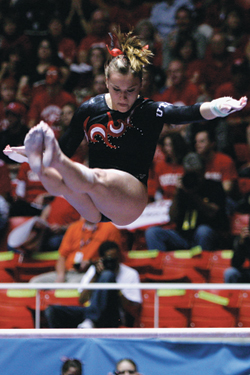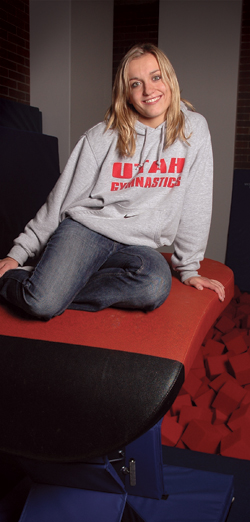
Sidelines
Cirque du Utah
Gymnast Daria Bijak plans to fly even higher with the Red Rocks in her second season.
by John Youngren
Daria Bijak laughs when she talks about what she used to think of coming to America, growing up as she did in Greven, Germany.
Now that she’s actually been living in the United States for more than a year—and is about to start her sophomore season with the University of Utah gymnastics team—she views things differently.
“We used to think, ‘Oh, the USA.
All the celebrities. All the excitement,’” she says now. “Then I came here and I discovered life is pretty much the same.” (She actually misses the hustle and nightlife of Cologne, where she trained, but that’s another story. Still, she says, “Salt Lake is a nice place. I like it here.”)
Bijak should be forgiven if she seems a little preoccupied with celebrities and the like. The 22-year-old is an aspiring actress and is studying performing arts at the U. And the understandably difficult choice she had to make a couple of years ago was literally this: Go to America, study and compete at the University of Utah—or join Cirque du Soleil.
More on that later.
First, the matter of how the young woman who trained in Cologne and has been a regular on Germany’s national gymnastics stage found herself in Salt Lake City.
“It is a long way from home,” Bijak says.
But it’s a good thing for the Utes, who placed second at the NCAA Championships to finish their 2007 season. This year, they’ll be counting on all-around competitor Bijak, among others, as they open their 2008 season at the Huntsman Center in a meet against three-time defending champion Georgia on January 11. Things don’t get easier from there: the Utes will host fellow NCAA “Super Six” finalist Nebraska on January 18.
And this time around, Bijak intends to be there every step of the way.
“I’m looking forward to the season,” she says. “I know it’s going to be good.”
Quite a difference from last year, at least in terms of sheer commotion. Even before she began competing as a Ute, Bijak was already pretty beaten up physically—fighting a host of minor injuries after competing at both the German National Championships in August 2006 (returning to her homeland less than two weeks after starting school in Utah, she won the all-around for the second year in a row) and the World Championships in Denmark at the end of that October—and ended up undergoing knee surgery before she could get serious about her first season with the Utes.
In addition, she was transitioning on two fronts—to life in a different culture and to being a first-year college student.
“Things were hard,” she says, referring to the beginning of her freshman year. “Everything was so new. It took a while to get to know how things worked.”
Despite those challenges, Bijak ended up having an All-American season as part of a Utah lineup that went a long way in 2007. And both Bijak and U of U coach Greg Marsden (starting his 33rd year as the only coach the Utes have ever had) have a sense that a more settled, healthier Bijak will only improve in 2008.
“She was injury-plagued and had some physical issues off and on all season,” Marsden says. “As well as she did last year, [2008] promises to be a much better year. She’s much healthier, which is a positive, and she knows what to expect this time around.”
Knowing what to expect would be an advantage—and a rarity—for Bijak. Her family moved 20 times in 12 years while she was growing up, but with gymnastics as a stabilizing force, she became a German national champion and competed for Turnteam Toyota, a gymnastics club based in Cologne. The all-around, vault, and floor champion at the 2005 German Championships, Bijak placed eighth at the 2005 World Championships in Melbourne, Australia.
In late 2005, she began thinking about her life beyond gymnastics—what she would do next and how she might further her education. It didn’t take her long to decide: She signed a National Letter of Intent to compete for the Utes in December and spent the next several months hustling to start school at the U in the fall of ’06.
Why and how the U? Former U of U gymnast and German National Team member Gritt Hofmann BS’06, an acquaintance of Bijak’s, told her she should think about attending school in the United States (specifically at the University of Utah). Hofmann mentioned the same thing to Marsden, who doesn’t make a habit of recruiting on an international basis but is always open to the possibility.
“Historically, all of our foreign athletes have come to us through other people,” he says. “I’m not traveling the world [searching for athletes], but I’ve been doing this long enough that I know a lot of people. And it’s pretty easy these days [via the Internet] to do the research necessary to determine what a person’s skill level is.”
That’s where it began with Bijak, who obviously had the credentials and the talent. But that, Marsden says, is only the first piece of the puzzle. For there are a host of challenges—including NCAA regulations and taking the American college entrance exam, the SAT, in English—and many fees and hurdles associated with the Immigration and Naturalization Service that must be dealt with to obtain a student visa.
“It’s a fairly complicated process, and a person has to be pretty motivated to get through it all to begin with,” Marsden says, adding that how one cuts through all that red tape (or not) turns out to be a good way to measure how serious a potential recruit is about coming to Utah in the first place.
“All of the kids from other countries have done very well for themselves once they’ve gotten here,” Marsden says. “They’re very appreciative of the experience here. They’re well prepared and do very well academically.”
Bijak is certainly an example of that. Though she admits she was “never much of a student,” she’s achieved a perfect 4.0 grade-point average in two of her semesters at the U so far. And another common barrier for foreigners also proved relatively simple for Bijak to overcome: mild accent aside, her English is nearly impeccable (she had studied the language for several years before putting it to use on a full-time basis once beginning at the U).
And yes, she’s also happy with her biggest decision to date—the one involving Cirque du Soleil. She did try out to become a performer with the traveling troupe (which has separate tours on continents around the world) and, ironically, got the job—shortly after she’d already made her commitment to come to the U.
At the time, she agonized over what to do.
“But I decided to go to college first, while I can still compete at a [high] level of gymnastics,” she says. “When I get done here, I’ll have a degree, which is important to me. Then I can do anything.”
In the meantime? First of all, she reluctantly decided to skip the 2007 World Championships in the fall to give her body a chance to heal as she trained for her sophomore season with the Utes in 2008. Now, she says, “I know what I need to do, I know how to compete. I know what to expect in the meets, in the practices, from the coaches. Now I can enjoy everything.”
And if all that means improvement on what was already a pretty stellar freshman year, Bijak’s performance should be out of this world.
— John Youngren BA’88 works in advertising for Love Communications in Salt Lake City and has written many previous articles for Continuum.
Return to Winter 2007 table of contents | Back to top
|



